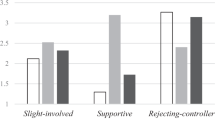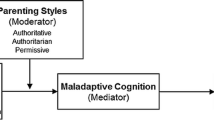Abstract
This study investigated the moderating effect of children’s perceived Internet parenting styles (IPS) on the relationship among their perceived Internet parenting behaviors (operationalized as warmth and control on Internet use from their parents), Internet expectancy (IE), and Internet addiction tendency (IAT). Participants were 3169 Taiwanese junior high school students ages 13–16. Results exhibited a dominance of both authoritative and authoritarian IPSs. Boys tended to perceive a permissive or neglectful IPS from their parents, while girls tended to perceive an authoritarian or authoritative IPS. IE and control had a consistent positive direct relationship with IAT across all IPS models. The hypothesized indirect effect was significant for the authoritarian parenting model from control to IAT and for the neglectful parenting model from both warmth and control to IAT. The study result implied that the quality of Internet parenting behaviors as demonstrated by different IPSs may be related with changes in students’ IE and IAT. Evidence from children’s amount of Internet use, their gender, and parental education level provided additional support on the study findings. The study results would shed light on the role of family function on students’ Internet use and provide suggestions on Internet parenting to reduce possible IAT.

Similar content being viewed by others
Notes
Singapore, Macau, Taiwan, and Hong Kong were countries and regions with the lowest fertility rates ranging from 0.82 to 1.19 in 2016 based on The World Factbook (2016).
References
Appel, M., Holtz, P., Stiglbauer, B., & Batinic, B. (2012). Parents as a resource: Communication quality affects the relationship between adolescents’ internet use and loneliness. Journal of Adolescence, 35(6), 1641–1648.
Baumrind, D. (1966). Effects of authoritative parental control on child behavior. Child Development, 37, 887–907.
Baumrind, D. (1971). Current patterns of parental authority. Developmental Psychology, 4(1), 1–103.
Baumrind, D. (1978). Parental disciplinary patterns and social competence in children. Youth and Society, 9(3), 239–276.
Baumrind, D. (1991). The influence of parenting style on adolescent competence and substance use. The Journal of Early Adolescence, 11(1), 56–95.
Block, J. J. (2008). Issues for DSM-V: Internet addiction. American Journal of Psychiatry, 165(3), 306–307. doi:10.1176/appi.ajp.2007.07101556.
Chao, R. K. (1994). Beyond parental control and authoritarian parenting style: Understanding Chinese parenting through the cultural notion of training. Child Development, 65(4), 1111–1119.
Chen, Y.-L., Chen, S.-H., & Gau, S. S.-F. (2015). ADHD and autistic traits, family function, parenting style, and social adjustment for Internet addiction among children and adolescents in Taiwan: A longitudinal study. Research in Developmental Disabilities, 39, 20–31. doi:10.1016/j.ridd.2014.12.025.
Chen, S., Weng, L., Su, Y., Wu, H., & Yang, P. (2003). Development of a Chinese Internet addiction scale and its psychometric study. Chinese Journal of Psychology, 45(3), 279–294.
Chou, C., Condron, L., & Belland, J. C. (2005). A review of the research on Internet addiction. Educational Psychology Review, 17(4), 363–388.
Chou, H.-L., Chou, C., & Chen, C.-H. (2016). The moderating effects of parenting styles on the relation between the Internet attitudes and Internet behaviors of high-school students in Taiwan. Computers & Education, 94, 204–214.
Darling, N., & Steinberg, L. (1993). Parenting style as context: An integrative model. Psychological Bulletin, 113(3), 487.
Eastin, M. S., Greenberg, B. S., & Hofschire, L. (2006). Parenting the internet. Journal of Communication, 56(3), 486–504.
Erikson, E. H. (1968). Identity: Youth and crisis. New York, NY: W. W. Norton.
Floros, G., & Siomos, K. (2013). The relationship between optimal parenting, Internet addiction and motives for social networking in adolescence. Psychiatry Research, 209(3), 529–534.
Goldman, M. S. (2002). Expectancy and risk for alcoholism: The unfortunate exploitation of a fundamental characteristic of neurobehavioral adaptation. Alcoholism, Clinical and Experimental Research, 26(5), 737–746.
He, L., Chen, Y., Kang, Y., Gong, W., Jin, Y., Zhu, X., et al. (2016). Investigation on Internet addiction disorder in adolescents in Anhui, People’s Republic of China. Neuropsychiatric Disease and Treatment, 12, 2233–2236. doi:10.2147/NDT.S110156.
Hu, L., & Bentler, P. M. (1998). Fit indices in covariance structure modeling: Sensitivity to underparameterized model misspecification. Psychological Methods, 3, 424–453.
Huang, X., Zhang, H., Li, M., Wang, J., Zhang, Y., & Tao, R. (2010). Mental health, personality, and parental rearing styles of adolescents with Internet addiction disorder. Retrieved from https://online.liebertpub.com/doi/full/10.1089/cyber.2009.0222
Jang, K. S., Hwang, S. Y., & Choi, J. Y. (2008). Internet addiction and psychiatric symptoms among Korean adolescents. Journal of School Health, 78(3), 165–171. doi:10.1111/j.1746-1561.2007.00279.x.
Lee, Y.-H., & Wu, J.-Y. (2013). The indirect effects of online social entertainment and information seeking activities on reading literacy. Computers & Education, 67, 168–177. doi:10.1016/j.compedu.2013.03.001.
Lee, Y.-H., Ko, C.-H., & Chou, C. (2015). Re-visiting Internet addiction among Taiwanese students: A cross-sectional comparison of students’ expectations, online gaming, and online social interaction. Journal of Abnormal Child Psychology, 43(3), 589–599. doi:10.1007/s10802-014-9915-4.
Leung, L., & Lee, P. S. (2012). The influences of information literacy, internet addiction and parenting styles on internet risks. New Media & Society, 14(1), 117–136.
Li, C., Dang, J., Zhang, X., Zhang, Q., & Guo, J. (2014). Internet addiction among Chinese adolescents: The effect of parental behavior and self-control. Computers in Human Behavior, 41, 1–7. doi:10.1016/j.chb.2014.09.001.
Lin, M.-P., Ko, H.-C., & Wu, J. Y.-W. (2008). The role of positive/negative outcome expectancy and refusal self-efficacy of Internet use on Internet addiction among college students in Taiwan. CyberPsychology & Behavior, 11(4), 451–457. doi:10.1089/cpb.2007.0121.
Maccoby, E. E., & Martin, J. A. (1983). Socialization in the context of the family: Parent-child interaction. In P. H. Mussen (Ed.), Handbook of Child Psychology: Formerly Carmichael’s Manual of Child psychology. Retrieved from http://agris.fao.org/agris-search/search.do?recordID=US201301452933
Meade, A. W., & Craig, S. B. (2012). Identifying careless responses in survey data. Psychological Methods, 17(3), 437–455.
Mesch, G. S. (2009). Parental mediation, online activities, and cyberbullying. CyberPsychology & Behavior, 12(4), 387–393.
OECD. (2015). Students, computers and learning: Making the connection. OECD Publishing. Retrieved from http://www.oecd-ilibrary.org/education/students-computers-and-learning_9789264239555-en
Özgür, H. (2016). The relationship between Internet parenting styles and Internet usage of children and adolescents. Computers in Human Behavior, 60, 411–424. doi:10.1016/j.chb.2016.02.081.
Rosen, L. D., Cheever, N. A., & Carrier, L. M. (2008). The association of parenting style and child age with parental limit setting and adolescent MySpace behavior. Journal of Applied Developmental Psychology, 29(6), 459–471.
Sobel, M. E. (1982). Asymptotic confidence intervals for indirect effects in structural equation models. Sociological Methodology, 13, 290–312.
The World Factbook 2016. (2016). Washington, DC: Central Intelligence Agency. Retrieved from https://www.cia.gov/library/publications/the-world-factbook/rankorder/2127rank.html
Tsai, C.-C., & Lin, S. S. (2001). Analysis of attitudes toward computer networks and Internet addiction of Taiwanese adolescents. CyberPsychology & Behavior, 4(3), 373–376.
Valcke, M., Bonte, S., De Wever, B., & Rots, I. (2010). Internet parenting styles and the impact on Internet use of primary school children. Computers & Education, 55(2), 454–464.
van Den Eijnden, R. J., Spijkerman, R., Vermulst, A. A., van Rooij, T. J., & Engels, R. C. (2010). Compulsive Internet use among adolescents: Bidirectional parent–child relationships. Journal of Abnormal Child Psychology, 38(1), 77–89.
West, R., & Hardy, A. (2005). Theory of addiction. New York, NY: Wiley-Blackwell.
Wong, Y. C., Ho, K. M., & Chen, H. (2015). Internet supervision and parenting in the digital age: The case of Shanghai. Open Family Studies Journal, 7(2), 112–123.
Wu, J.-Y. (2015). University students’ motivated attention and use of regulation strategies on social media. Computers & Education, 89, 75–90. doi:10.1016/j.compedu.2015.08.016.
Wu, J.-Y. (2017). The indirect relationship of media multitasking self-efficacy on learning performance within the personal learning environment: Implications from the mechanism of perceived attention problems and self-regulation strategies. Computers & Education, 106, 56–72. doi:10.1016/j.compedu.2016.10.010.
Wu, J. Y.-W., Ko, H.-C., Tung, Y.-Y., & Li, C.-C. (2016a). Internet use expectancy for tension reduction and disinhibition mediates the relationship between borderline personality disorder features and Internet addiction among college students—One-year follow-up. Computers in Human Behavior, 55, 851–855. doi:10.1016/j.chb.2015.09.047.
Wu, J. Y. W., Ko, H.-C., Wong, T.-Y., Wu, L.-A., & Oei, T. P. (2016b). Positive outcome expectancy mediates the relationship between peer influence and internet gaming addiction among Adolescents in Taiwan. Cyberpsychology, Behavior, and Social Networking, 19(1), 49–55. doi:10.1089/cyber.2015.0345.
Wu, J. Y., & Peng, Y.-C. (2016). The modality effect on reading literacy: Perspectives from students’ online reading habits, cognitive and metacognitive strategies, and web navigation skills across regions. Interactive Learning Environments. doi:10.1080/10494820.2016.1224251.
Wu, C. S. T., Wong, H. T., Yu, K. F., Fok, K. W., Yeung, S. M., Lam, C. H., et al. (2016c). Parenting approaches, family functionality, and internet addiction among Hong Kong adolescents. BMC Pediatrics, 16(1), 130. doi:10.1186/s12887-016-0666-y.
Author information
Authors and Affiliations
Corresponding author
Rights and permissions
About this article
Cite this article
Chou, C., Lee, YH. The Moderating Effects of Internet Parenting Styles on the Relationship Between Internet Parenting Behavior, Internet Expectancy, and Internet Addiction Tendency. Asia-Pacific Edu Res 26, 137–146 (2017). https://doi.org/10.1007/s40299-017-0334-5
Published:
Issue Date:
DOI: https://doi.org/10.1007/s40299-017-0334-5




